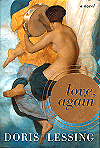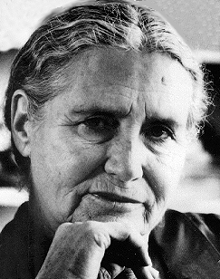| |

ABOUT A YEAR AGO a women's magazine wanted to interview me about women and ageing. Out of the blue the reporter asked: "Wouldn't you agree that every woman deserves to experience at least one grand passion?"
 I was somewhat taken aback and all I could do was nod in polite agreement. When I was sent the interview it said: "'Everyone deserves at least one grand passion', says Merete Mazzarella." I managed to get the sentence removed but I don't think I managed to convince the reporter that there was anything wrong with her approach. I was somewhat taken aback and all I could do was nod in polite agreement. When I was sent the interview it said: "'Everyone deserves at least one grand passion', says Merete Mazzarella." I managed to get the sentence removed but I don't think I managed to convince the reporter that there was anything wrong with her approach.
 I have thought of her now and then - like me she was around fifty and I have wondered whether she had had her grand passion or was still waiting. I have thought of her now and then - like me she was around fifty and I have wondered whether she had had her grand passion or was still waiting.
 (I have of course also wondered whether she imagined me to be still waiting.) (I have of course also wondered whether she imagined me to be still waiting.)
 I was reminded of her once again when I read Doris Lessing's latest novel, Love, again which is specifically about women and ageing - and about women and passion. These themes are by no means new in Lessing's work: in The Summer Before the Dark the main character is a woman who has been used to turning heads and who at forty suddenly begins to feel invisible because construction workers have stopped whistling after her. I was reminded of her once again when I read Doris Lessing's latest novel, Love, again which is specifically about women and ageing - and about women and passion. These themes are by no means new in Lessing's work: in The Summer Before the Dark the main character is a woman who has been used to turning heads and who at forty suddenly begins to feel invisible because construction workers have stopped whistling after her.

 The protagonist of Love,again - which by and large has had a chillier reception than The Summer Before the Dark - is sixty-five-year-old Sarah Durham who, long widowed, has thrown all her energy into writing plays and running a small theatre group in London. The group is producing a play about Julie Vairon, a beautiful, mysterious and artistically gifted young quadroon from Martinique who in the early nineteenth century accompanied a lover to France, was jilted, managed to make her living as a teacher in the provinces, was jilted once more - and finally drowned herself just as a respectable small town citizen had offered to make an honest woman of her. Julie comes across not only as a feminist pioneer but also as a kind of female Orpheus, both seductive and dangerous who - even a century and a half after her death - seems to set free the dreams and secret longings of all who come into contact with her. As far as Sarah is concerned this means falling in love - not once but twice, and both times with men young enough to be her sons, men who are drawn to her but are ultimately not willing to enter into even a casual sexual relationship with her. The protagonist of Love,again - which by and large has had a chillier reception than The Summer Before the Dark - is sixty-five-year-old Sarah Durham who, long widowed, has thrown all her energy into writing plays and running a small theatre group in London. The group is producing a play about Julie Vairon, a beautiful, mysterious and artistically gifted young quadroon from Martinique who in the early nineteenth century accompanied a lover to France, was jilted, managed to make her living as a teacher in the provinces, was jilted once more - and finally drowned herself just as a respectable small town citizen had offered to make an honest woman of her. Julie comes across not only as a feminist pioneer but also as a kind of female Orpheus, both seductive and dangerous who - even a century and a half after her death - seems to set free the dreams and secret longings of all who come into contact with her. As far as Sarah is concerned this means falling in love - not once but twice, and both times with men young enough to be her sons, men who are drawn to her but are ultimately not willing to enter into even a casual sexual relationship with her.
 Sarah looks at those around her - who all seem young younger than she - and feels like "a miserable old ghost at the feast". After decades of being busy, successful and perfectly content she now observes both her body and her psychological reactions with a mixture of clear-sightedness, self-hatred and humiliation - she wonders at her sudden desire to buy new clothes at her impulse to have her face lifted: "With better luck (meaning, if I had not entered Julie's territory), I could have lived comfortably with something like a light dimmimg, or a fire dying down unnoticed, and arrived at being really old, hardly feeling the transition." Sarah looks at those around her - who all seem young younger than she - and feels like "a miserable old ghost at the feast". After decades of being busy, successful and perfectly content she now observes both her body and her psychological reactions with a mixture of clear-sightedness, self-hatred and humiliation - she wonders at her sudden desire to buy new clothes at her impulse to have her face lifted: "With better luck (meaning, if I had not entered Julie's territory), I could have lived comfortably with something like a light dimmimg, or a fire dying down unnoticed, and arrived at being really old, hardly feeling the transition."
 As it is, she slides into a long depression which she herself compares to a physical illness and which Lessing describes with such chilling intensity that the reader cannot but feel her pain. As it is, she slides into a long depression which she herself compares to a physical illness and which Lessing describes with such chilling intensity that the reader cannot but feel her pain.
 Why then has the reception of the novel not been more enthusiastic? One reason is certainly that the people around Sarah - including the two objects of her passion - come across as strangely shadowy: neither the twenty-eight-year-old, androgynous and somewhat manipulative actor Ben nor the slightly older, more immediately appealing but married director Henry ultimately seems to have much life outside of Sarah's imagination. Even less convincing - except as a kind of Gothic fantasy - is the portrait of Sarah's friend, the wealthy landowner Stephen, who contributes money to the theatre because he has persuaded himself that he is in love with the dead Julie and whose wife has withdrawn into a Lesbian relationship. Why then has the reception of the novel not been more enthusiastic? One reason is certainly that the people around Sarah - including the two objects of her passion - come across as strangely shadowy: neither the twenty-eight-year-old, androgynous and somewhat manipulative actor Ben nor the slightly older, more immediately appealing but married director Henry ultimately seems to have much life outside of Sarah's imagination. Even less convincing - except as a kind of Gothic fantasy - is the portrait of Sarah's friend, the wealthy landowner Stephen, who contributes money to the theatre because he has persuaded himself that he is in love with the dead Julie and whose wife has withdrawn into a Lesbian relationship.
 Another reason is that Lessing has wanted to do so much more than simply describe an ageing woman's struggles with a sudden upsurge of sexual feelings long thought dead. She has also wanted to analyse the concept of romanticism and to show the long-term consequences of childhood experiences of rejection. She editorialises on the way a younger generation views love, on the deplorable state of modern education in Britain and on how Art is exploited in the interests of commercial profit: the play Julie Vairon is turned into a musical and Julie's small French town is exploited by the tourist industry. There is simply too much telling and too little showing - worse, there is too much lecturing. Another reason is that Lessing has wanted to do so much more than simply describe an ageing woman's struggles with a sudden upsurge of sexual feelings long thought dead. She has also wanted to analyse the concept of romanticism and to show the long-term consequences of childhood experiences of rejection. She editorialises on the way a younger generation views love, on the deplorable state of modern education in Britain and on how Art is exploited in the interests of commercial profit: the play Julie Vairon is turned into a musical and Julie's small French town is exploited by the tourist industry. There is simply too much telling and too little showing - worse, there is too much lecturing.
 It is almost as if Lessing's real story is so painful that she is tempted to distance herself from it by constant digressions. It is almost as if Lessing's real story is so painful that she is tempted to distance herself from it by constant digressions.
 But it is certainly also possible that the negativity of Lessing's critics is in part a result of their need to distance themselves, to repress threatening insights - or possibilities. No, Love, again is by no means a well-balanced work but it's a work that continues to challenge one's peace of mind. But it is certainly also possible that the negativity of Lessing's critics is in part a result of their need to distance themselves, to repress threatening insights - or possibilities. No, Love, again is by no means a well-balanced work but it's a work that continues to challenge one's peace of mind.
|




